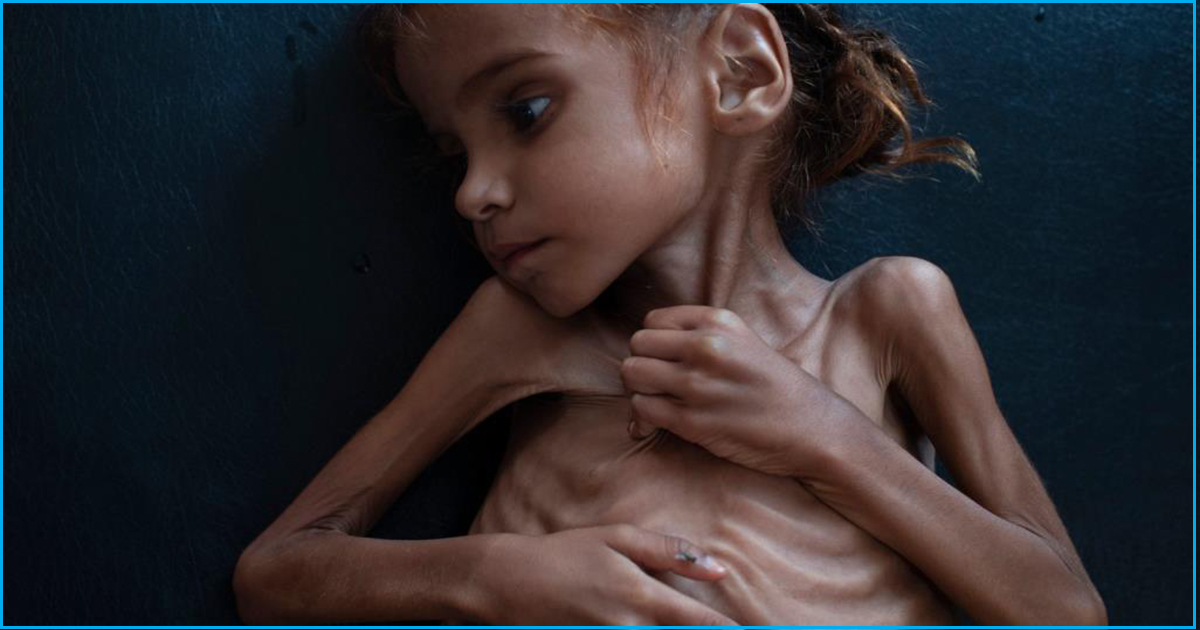In battle-weary Yemen, 7-year-old Amal Hussain, whose horrifying emaciated photograph took people by storm and symbolized the country’s long-running war, died in a hospital on October 26. The haunting photograph by Pulitzer Prize-winning photojournalist Tyler Hicks which was published in The New York Times had heart-broken people offering her money and help.
The devastating portrait of the young girl in pain, who died in a refugee camp several miles away from the hospital, became emblematic of the horrid condition of the war-torn country, where the civil war is killing thousands each day. The country is a stark picture of hunger, despair, violence and disease.
No money to take Amal to the hospital
“My heart is broken. Amal was always smiling. Now I’m worried about my other children,” wept Amal’s mother Mariam Ali during a phone interview.
The New York Times reported that although Amal was being fed with milk by the nurses every two hours, she was suffering from diarrhoea and kept vomiting, and her condition kept deteriorating. As Amal’s doctor in charge Mekkia Mahdi pointed out, she was “no meat” and “only bones”.
Although Amal was still sick and malnourished, she had to be discharged from the hospital because there was a requirement for the room for other patients. “We have many more cases like her,” said Dr Mahdi. Dr Mahdi suggested that Amal’s mother take her to a Doctors Without Borders hospital in Abs, but they had no money. The hospital was 15 miles away, but due to the significant rise in fuel prices, Amal’s family could not afford to take her there. “I had no money to take her to the hospital,” Mariam said. “So I took her home.”
Amal was discharged on October 26, and she died three days later.
Amal’s family flees home
Three years ago, Amal and her family had to flee their home in the mountains due to Saudi airstrikes. Saada, a province on the border with Saudi Arabia, was where they lived. Since 2015, at least 18,000 airstrikes have been the cause of the plane’s destruction. Saada is also home to the Houthi rebels, who are in control of northern Yemen. The Houthi rebels are seen by Saudi crown prince Mohammed bin Salman as a proxy for their rival, Iran.
The family now lives in a hut made from straw and plastic sheeting. Relief agencies provide them with sugar and rice in the camp, but this was not enough for the betterment of Amal’s critical condition.
War-torn Yemen
The Saudi-led coalition and its Yemeni allies, led by Crown Prince Mohammed bin Salman, have initiated periodic blockades, strict import restrictions, withholding the salaries of several civil servants, causing the country to plunge deeper into the realm of poverty. Infrastructure has been destroyed, jobs have been lost have prices have soared. Every day, the economic collapse is increasing at an alarming rate. Emergency food aid is what eight million Yemenis depend on for survival, and the number might soon increase to half of Yemen’s population, The New York Times wrote. Like Amal, thousands of lakhs of children and infants are critically ill, malnourished, ailing, and are fighting for their lives.
The war has recently received more attention because of the killing of a Saudi dissent, Jamal Khashoggi, in Istanbul. Saudi actions in other places have been highlighted, focusing on airstrikes that are killing thousands, anywhere and everywhere in the country. Social media has seen unpaid professors desperately asking for help, and to feed their families doctors and teachers are being bound to sell their gold, land or cars. Saudi officials have kept justifying their actions by saying that these atrocities are a proxy for its rival, Iran. People now fear that a terrifying famine might engulf the country soon, pushing several more people to the brink of destruction and death.
Facebook takes down, then restores, pictures of dying children
The New York Times had recently published an article which contained photographs of emaciated, dying children, and hours after people shared the article on Facebook, it temporarily removed the photographs. This was the article where Amal’s photograph was also published.
Facebook, however, addressed the issue later. “As our community standards explain, we don’t allow nude images of children on Facebook, but we know this is an important image of global significance. We’re restoring the posts we removed on this basis,” an e-mailed statement by a spokeswoman read.
The New York Times, in yet another article, clarified why they are posting pictures of these dying children. “They are brutal,” it said. “But they are also brutally honest.” These pictures are a symbol of the suffering of millions, and the dread that Yemen is today. They are a representation of the calamitous war in which thousands are being killed by airstrikes aided by American-supplied bombs and intelligence, and of the fear of a ruinous famine.
Amal’ means ‘hope’, and that is precisely what Yemenis and looking up to now. The Logical Indian hopes for a better tomorrow for the Yemenis, a tomorrow with no war and no famines, no death and no destruction, and a tomorrow with healthy, playing, smiling children.
Also Read: Look Back: Photographs Which Defined 2015











